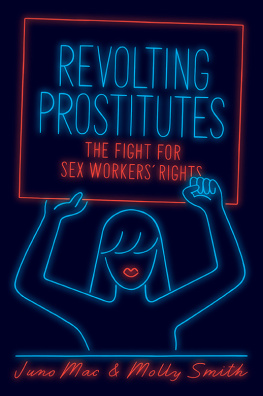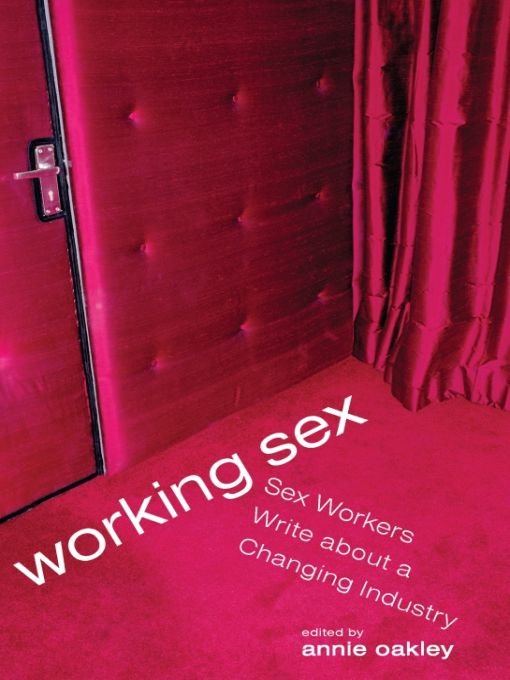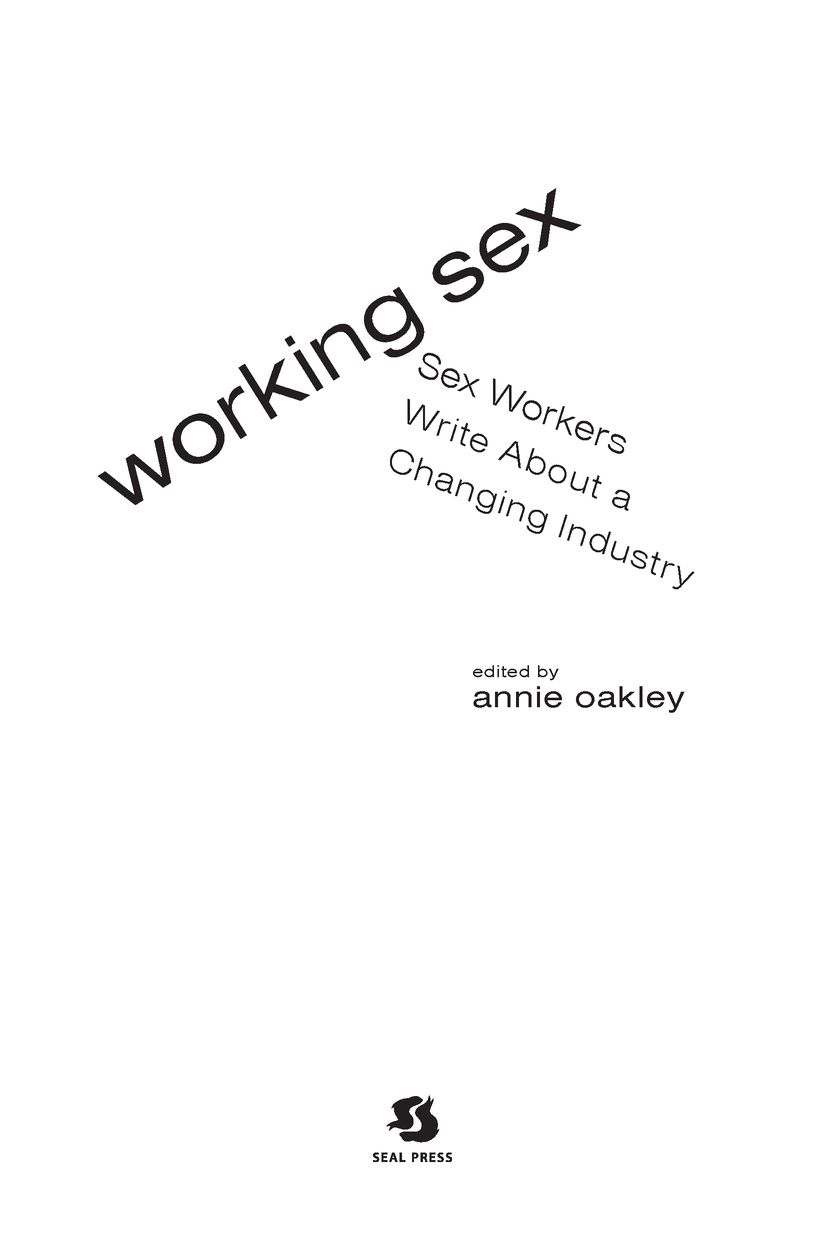Table of Contents
This book is for the ones who blazed the trail.
introduction
Annie Oakley
One time in the olden days when I was working at the peep show (gateway drug to prostitution) a man came in whod made the rounds of most of the girls but never seen me. I walked into my side of the scrubby booth known as the Victorian Parlor (complete with ye olde lounge-style lawn chair) and started the lame boob-rubbing moves that were always the prequel to the removal of my shirt. The guy wasnt interested and motioned for me to knock it off and come closer to the glass. He had some greasy piece of paper that he was fiddling with. It looked like it was about a thousand years old and had been used to wrap a hamburger. He unfolded it and pressed it to the glass for me to squint at.
Do you know what this is? he asked, looking at me intently and already rubbing his crotch through his jeans. It was some kind of clipping from a magazine, folded so many times that only mere molecules of the photo were left in between the web of white creases. I couldnt even muster a guess.
Its the Partridge Family school bus! I want you to pretend like youre driving the Partridge Family school bus! Not naked, not speaking lewdly about Danny Partridge, just with my feet on the glass and my hand on the invisible gearshift, making motor sounds. It was an easy $20 for five minutes of my time, and eventually he got passed off onto Carrie, a nightshift girl who really did drive a school bus during the day. Jackpot.
Thats the story I used to trot out when people would ask me what was the weirdest customer experience Id ever had. Which was always the first question theyd ask upon finding out what I did for a living (if they didnt immediately change the subject), followed closely by How much do you make? The Partridge Family guy wasnt even really the weirdest, but the real answer wouldve been a lot less interesting, and clearly people were digging for the entertaining. It made the job sound funny and light, like I spent the whole day indulging harmless adult children (hey... wait... ). The kooky specificity of a Partridge Family bus fetish let them off the hook somehow, reassured them that their own weird desires were at least not that weird, and freed them from having to imagine themselves in the customers role. Titillation without incrimination. This is the kind of story that Americans most want to hear from people who work in the sex trade, and consequently this is the kind of story that most often gets told, when anything gets told at all.
There are a few different ways ones story is allowed to be entertaining: funny, sexy, tragic, scandalous. Repentance, marriage, college graduation, lurid death, or a piece of investigative journalism are the favored endings. The rigid boundaries of archetype, be they happy hooker or downtrodden whore, are a kind of invisibility. They are one-dimensional. Should the story twist to the side youll see nothing at all. Once marked by telling the story, you are branded for life. Your credibility is gone, you are forever seen in the context of the work. You dont get to go back to being a civilian. Who needs that kind of shit? People remain silent. This silence, this invisibility, is the linchpin upon which rests the glorious suspension of disbelief that is at the core of nearly every transaction in a service economy. Its the intellectual sleight of hand where one denies oneself knowledge of the essential personhood of the provider of a service or the maker of a product so as not to impede ones enjoyment of the product or service. In this way one avoids being implicated in the boredom, poverty, or ugliness of the work of the service provider. In late capitalist America under the rule of market logic, suspension of disbelief becomes almost a survival skill.
The sex industry is a huge industry. Think of all the venues: Internet porn, magazines, phone sex, dirty movies, strip clubs, peep shows, and hookers from the street, upscale agency, or the ad in the back of your edgy local weekly. Estimates put the U.S. sex industry at around $12 billion annually and growing rapidly, and the number of people presently employed in it at upwards of six million. To say nothing of those who have been a part of it in the past. What are the implications of the invisibility of such a huge segment of the population? What does it say about us as sexual consumers that we prefer our product to be anonymous? In a probably accidental rare moment of lucidity, former Surgeon General C. Everett Koop observed to ABC News that the sex industry is making billions of dollars a year, is spreading to cable television and to the Internet, and yet their employees are considered to be throwaway people. When you refuse to recognize someones humanity, you dont have to worry about their working conditions, their safety, their health, their ability to make a decent living. Thus the cops, pimps, club owners, and minimoguls at the head of petty fiefdoms like the Girls Gone Wild porn empire get to run the industry with little outside interference or regulation. Not only is this bad for the people who work in the industry, but are pimps, police, and Joe Francis who you really want to trust with the shaping of the national libido?
Sex workers telling stories, humanizing ourselves through the sharing of experience and insight, punctures the bloated dream of consumption without consequence. It puts a real face on the mythological creatures that are the subject of so much fantasizing and demonizing. It moves us from a weird landscape populated by the iconography of peoples fears and desires to a tangible, relatable reality; and only from there can we begin to be taken seriously as people deserving of safety, agency, and respect.
at one point when I was taking a break from the sex industry, I became a housecleaner. My friend and I worked together, cleaning up after grown adults and fomenting cheerful resentment. It wasnt long before we knew who among our clients had an alcohol problem, who refused to have sex with her husband, who wore a padded-butt mangirdle, who was trying his hand at the newspaper personal ads. Nobody ever told us these personal details, nobody ever really told us much besides when to show up and what to use on the floors. A lot of stuff becomes obvious quickly when youre observing people to whom youre invisibleand when you occasionally go through their drawers. The point is, the help always knows more about the boss than the boss knows about them. Sex workers are in a unique position to observe. The work takes place in a freakish crucible of the dynamics of race, class, gender, and sexuality. The fact that, by and large, we are relegated to a simple mascot position in public dialogue about these dynamics is a critical mistake.
Occasionally an academic will be thrown our way to spend a year slumming for a story, or someone will publish a memoir, but more frequently self-representation is a luxury we are denied. How would we represent ourselves if given the opportunity? In ten years of working in the business and meeting other whores, the one thing thats become apparent is that none of us can agree on a take on any aspect of the work. Even within ourselves, feelings and convictions can shift several times over the course of a night. Sometimes you see the best of people and yourself, and everything seems so easy and attainable, and the money feels like its rolling in for free. Other times its the worst job youve ever had and you cant believe the ugliness of humanity and you want to get out and never come back. The sex industry encompasses so many variations on how to get to the punchline of ass showing (domination! hooking! lap dances! let me count the ways!) and so many kinds of people who get into it for such different reasons and with different options for getting out. The possible experiences in the sex industry are so complicated and contradictory, there is no way to describe it without a multiplicity of voices.






